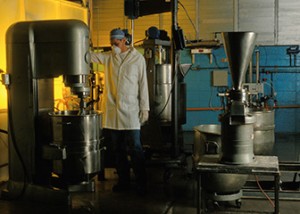Renewable Energy Jobs
Still machine operators and tenders set up, operate, or tend continuous flow or vat-type equipment.
Still machine operators and tenders set up, operate, or tend continuous flow or vat-type equipment.
Separating, filtering, clarifying, precipitating, and still machine setters, operators, and tenders or still machine operators and tenders set up, operate, or tend continuous flow or vat-type equipment. These includes filter presses, shaker screens, centrifuges, condenser tubes, precipitating, fermenting, or evaporating tanks, scrubbing towers, or batch stills. They operate machines that extract, sort, or separate liquids, gases, or solids from other materials to recover a refined product. They also operate dairy processing equipment.
 Those with machine operator jobs main duty is to set up or adjust machine controls to regulate conditions such as material flow, temperature, or pressure. They monitor material flow or instruments such as temperature or pressure gauges, indicators, or meters to ensure optimal processing conditions. Still machine operators and tenders start agitators, shakers, conveyors, pumps, or centrifuge machines, then turn valves or move controls to admit, drain, separate, filter, clarify, mix, or transfer materials. They also communicate processing instructions to other workers.
Those with machine operator jobs main duty is to set up or adjust machine controls to regulate conditions such as material flow, temperature, or pressure. They monitor material flow or instruments such as temperature or pressure gauges, indicators, or meters to ensure optimal processing conditions. Still machine operators and tenders start agitators, shakers, conveyors, pumps, or centrifuge machines, then turn valves or move controls to admit, drain, separate, filter, clarify, mix, or transfer materials. They also communicate processing instructions to other workers.
When the processing starts, still machine operators and tenders measure or weigh materials to be refined, mixed, transferred, stored, or otherwise processed. They dump, pour, or load specified amounts of refined or unrefined materials into equipment or containers for further processing or storage. Still machine operators and tenders remove full containers from discharge outlets and replace them with empty containers. They also operate machines to pack bottles into cartons or crates.
Still machine operators and tenders examine samples visually or by hand to verify qualities such as clarity, cleanliness, consistency, dryness, and texture. They collect samples of materials or products for laboratory analysis. Still machine operators and tenders test samples to determine viscosity, acidity, specific gravity, or degree of concentration, using test equipment such as viscometers, pH meters, or hydrometers. They also maintain logs of instrument readings, test results, and shift production, and send production information to computer databases.
As part of their jobs, still machine operators and tenders connect pipes between vats and processing equipment. They assemble fittings, valves, bowls, plates, disks, impeller shafts, and other parts to equipment in order to prepare equipment for operation. Still machine operators and tenders remove clogs, defects, or impurities from machines, tanks, conveyors, screens, or other processing equipment. They install, maintain, or repair hoses, pumps, filters, or screens to maintain processing equipment, using hand tools.
Still machine operators and tenders clean or sterilize tanks, screens, inflow pipes, production areas, or equipment, using hoses, brushes, scrapers, or chemical solutions. They turn valves to pump sterilizing solutions or rinse water through pipes or equipment or to spray vats with atomizers. Still machine operators and tenders inspect machines or equipment for hazards, operating efficiency, malfunctions, wear, or leaks. They operate machines to process materials in compliance with applicable safety, energy efficiency, or environmental regulations.
Still machine operators and tenders are employed mainly in factories. Although the work is not inherently dangerous, hazards exist and workers must adhere to safety standards. Still machine operators and tenders usually wear protective equipment, such as safety glasses, and earplugs. Most work full time, and some work evenings and weekends.
To enter a green job as a machine operator, a high school diploma, GED, or related experience is needed. Although not always required, employers prefer to hire workers who have a high school diploma. Employees in these jobs need anywhere from a few months to one year of working with experienced employees. One year or more is required to become highly skilled.
The Bureau of Labor Statistics (BLS) expects the employment in this field to grow about 2.9% from 2012 to 2022, slower than the average for all green jobs. The BLS projected 14,400 still machine operator new openings between 2012 and 2022, and noted 41,000 jobs are currently filled. Titles include Chemical Operator, Cellar Worker, Cheese Maker, Refinery Operator, Blender/Cook, Brewer, Digester Cook, Paper Machine Tender, Plant Operator, and Dryer Operator. The BLS further reports that the median annual wage for salaried Still machine operators and tenders was $40,660 in 2013 with median hourly wage of $19.55. Across the US job market, he lowest 10 percent earned less than $23,270, and the top 10 percent earned more than $61,110. Still machine operators and tenders can receive the best compensation in Massachusetts, where they earn compensation, on average, of about $49,540. People in this job function are compensated at the highest average salary in Public Administration, where they get average pay levels of $63,270.